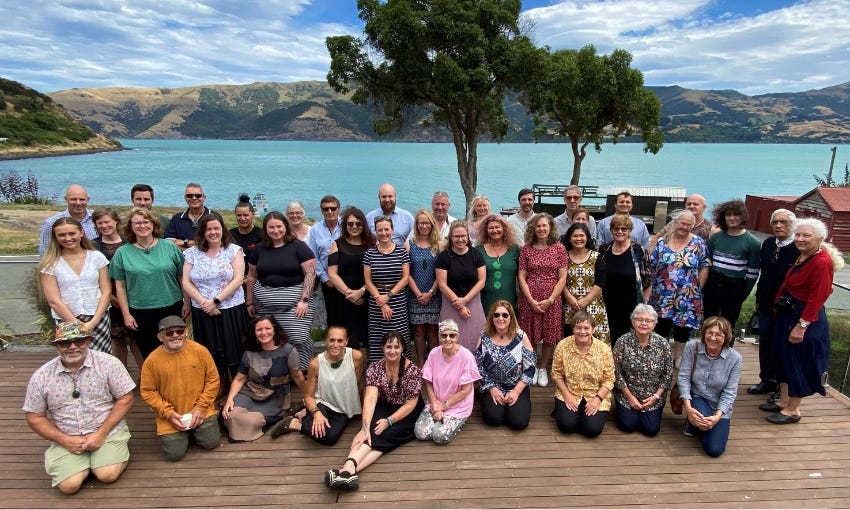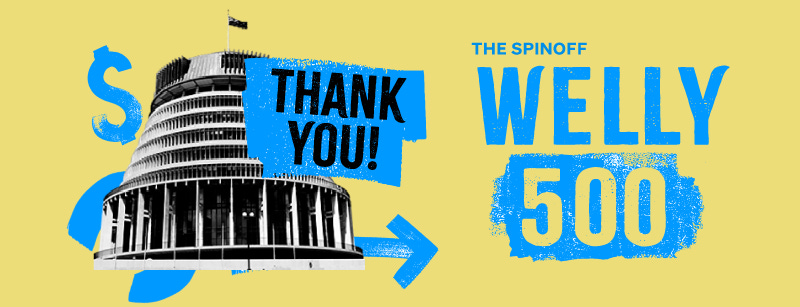How one rūnanga is preparing for climate change
Ōnuku Rūnanga’s climate plan centres whānau resilience.
Kia ora! Welcome to Future Proof. Thanks for joining me. This week: sustainability at the Paris Olympics, and boat-munching killer whales are just having fun. But first: Ōnuku Rūnanga is creating a whānau-focused climate plan.
Whānau and experts gather for a climate wānanga in Akaroa Harbour. Image credit: Ōnuku Rūnanga.
When everyone’s struggling with climate anxiety – or generally feeling overwhelmed – how do you even start thinking about preparing for a climate-altered future?
You start by just doing, says Debbie Tikao.
Tikao is te taiao (nature) portfolio manager for Ōnuku Rūnanga, representing the Ngāi Tarewa and Ngāti Irakēhu hapū (subtribes) based in Akaroa Harbour on Banks Peninsula.
With wildfires, drought, and sea level rise on the horizon in their rohe (region), the rūnanga (tribal council) is preparing the community with a climate plan – with a difference.
Most people are never going to read a dry climate document, Tikao reckons. “We’re flipping climate change adaptation planning on its head, by focusing on the doing, the action,” she says. The programme is called Te Kori a te Kō, and is deeply grounded in local experiences and histories. Because climate impacts are felt locally, solutions should be local too, the rūnanga believes.
The first step is to get people thinking, and acting, at home. At a wānanga (discussion) held earlier this year, whānau (families) and experts met to “share ideas and fears”. Groups competed in a game to see who could devise “the most resilient” home, as judged by three rangatahi (young people). Ideas dreamt up included planting shade trees, coordinating a street-wide orchard, and even creating an insect farm.
“It was empowering people: you don't need to sit and wait for council or wait for whomever,” says Tikao. “There are things you can do to start to make your homes more resilient to the coming changes.”
The next step – which is still at the early planning stage – will be ki uta ki tai (from the mountains to the sea), dividing up the Harbour into subcatchments and activating communities. At this scale, on-the-ground mahi (work) could include planting firebreaks, revegetating gullies to help stop soil washing into the harbour, or restoring wetlands to recharge water sources.
Protecting sites of cultural significance – like urupā (burial grounds) – and mahinga kai (cultural food gathering) will also be at the heart of climate efforts.
In the harbour itself, the rūnanga are exploring kelp farming. This could bring triple benefits as a carbon sink, a biodiversity booster, and the basis of a sustainable kelp product economy.
The rūnanga already supports whānau to install māra kai (gardens), plant trees, and monitor streams with both mātauranga Māori (traditional knowledge) and western science. It’s this physical activity that’s key to engaging folks, and helping them feel positive instead of mired down in climate doom, Tikao says. “Learning through doing, and engaging in climate change discussion through actively doing, that's what is getting people interested.”
Te Kori a te Kō’s action-first approach is capturing attention too – it will be presented by Tikao at the International Federation of Landscape Architects World Congress in Istanbul later this year.
A good day in the capital
Thank you to everyone who supported The Spinoff Welly 500 over the last couple of weeks. Not only did we reach our target in record time, but the additional donations and messages of support make it possible for us to sustain and grow our work in Wellington. You can check out our recent Welly coverage here.
The Paris Olympics want to be the most sustainable games yet
Paris Olympics officials have an ambitious goal to halve the carbon footprint of the games compared to London and Rio. Viewing sustainability as “a collective sport”, Paris officials have limited new construction and will use renewable energy, while French cuisine will get a sustainability makeover in the eatery at the centre of the Olympic Village. Meanwhile, the question of whether athletes will swim in the Seine River has prompted conversations about sewage – and repurposing “le pipi” to use as fertiliser: “If we used the urine from greater Paris to fertilise wheat, it would be enough to produce 25 million baguettes a day.”
Climate finance milestone reached – but there’s a catch
Back in 2009, rich countries – including New Zealand – agreed to boost climate finance for developing countries to $100 billion a year by 2020. This funding should be “new and additional” to existing foreign aid, countries agreed in negotiations. This goal was finally achieved in 2022 – two years late. But one analysis suggests that the target was only reached due to $27 billion of existing funding being relabelled as climate aid. Meanwhile, a Reuters investigation found that many rich countries were using loans and grants with special conditions to funnel billions of climate aid back to their own economies.
Could Shane Jones’ pro-mining culture war backfire?
The minister for resources is so extremely pro-mining that he could stir up backlash that ultimately debilitates the mining industry, Sefton Darby argues on The Spinoff. Anti-mining fallout could be exacerbated by the absence of environmental red lines and community input in the fast-track legislation too, the former national manager of minerals at MBIE writes.
Meanwhile, where else could we look for minerals to power the green transition? Scientists are investigating whether we could “mine the macroalage” – aka, harvest seaweeds, some of which hyperaccumulate rare earth elements. And in the Canadian city of Kingston, there’s an emerging circular economy for EV components and other electronics to recycle critical minerals.
Behind the Story is a new podcast from The Spinoff that goes beyond the bylines. Join The Spinoff editor Madeleine Chapman every Saturday as she sits down with a staff writer or contributor to gain more insight about a big story on The Spinoff from the week. Listen now.
More stories
A new theory for why killer whales keep attacking boats: it’s fun, and they’re bored teenagers.
An excerpt on hope from the book ‘I want a better catastrophe’ by Andrew Boyd is a must-read: “Grounded hope offers us no guarantee that we’ll ever walk on out of the darkness, but it shows us how to walk through it.”
This chocolate is made using the whole cocoa pod – not just the inner bean – cutting down on waste, and carbon.
New Zealand’s latest bird atlas is complete, documenting more than 100 different species in a massive citizen science effort.
The US has introduced new guidelines to define “high integrity” carbon offsets that deliver real emissions reductions, in an attempt to strengthen a market marred by greenwashing.
Almost half of all new car sales globally are gas-guzzling SUVs, making them a major driver of skyrocketing emissions. If SUVs were a country, they’d be the world’s fifth biggest greenhouse gas emitter.
Researchers are catching and tagging broadnose sevengill sharks in Fiordland to figure out how climate change is affecting them.
Funding for the Predator Free Apprentice Programme has ended, but positive impacts have kindled hopes for funding to revive the initiative.
To finish this edition, peekaboo! How cute is Tiu the kiwi at the West Coast Wildlife Centre? Across the strait, some of Tiu’s fellow fuzzballs have been settling into their new Welly neighbourhood. Esme Stark tagged along to witness our national bird get released into our national capital. “There’s something special about kiwi… ‘You see it on people’s faces. Before it was this mythical creature, now it’s right in front of them. It’s emotional.’”
Birds have the kiwi to my heart,
Ellen
Future Proof is looking for a sponsor!
Connect your brand with an insightful exploration of environmental news, reaching influential readers committed to sustainability and staying informed about the state of our natural world. Contact commercial@thespinoff.co.nz to learn more.
Got some feedback about Future Proof or topics you’d like covered? Get in touch with me at futureproof@thespinoff.co.nz















Ōnuku Rūnanga has got it right. With ecocidal governments all over the world, the only way we are going to change things is from the bottom up. Once you get involved in actively working to mitigate or in some way delay the climate crisis, you learn its reality. Once you know something, you can't 'unknow' it and this will mean people getting more vocal about political decisons that are being made 'on our behalf', and thinking more carefully before supporting politicians, whose empty promises of tax cuts and more jobs, are in contradiction of the reality of having to aim for a world that produces (net) zero carbon. Our 'Leaders' don't lead, they follow the trends, far more interested in being voted back in, then doing something that radically improves our prospects, but risks being unpopular.